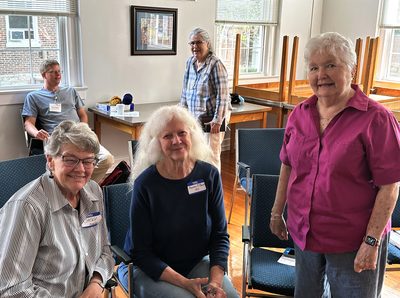Relationships of repair
Posted on October 1, 2023, by Libby Comeaux CoL
America is an old house. We are the heirs to whatever is right or wrong with this house.
Isabel Wilkerson, “Caste”

Photo by Paulette Peterson
When I think back on the Land Justice Retreat at the Motherhouse in June, I remember several important themes.
The young millennial facilitators we invited from the Nuns and Nones Land Justice Project were a joy to be with — so gentle, kind, intelligent and inspiring. The covenantal community they have formed, with its contemplative component, so obviously sustains them. Creating spaces of encounter, they prepare us to ask who else has a history on the land, and how might we center their stories and needs as we face long-term decisions?
We had already been learning from the Loretto Link Good Trouble Working Group and the Loretto Roots Project, so the history of land dispossession through racial violence was not new. More details at the June retreat allowed it to sink in. We discussed and generally agreed with a saying by Nikki Sanchez that “This history is not your fault, but it is absolutely your responsibility.”
As we met, it was 200 years after the 1823 Johnson v. McIntosh decision that used the 15th century papal bulls to justify mistreatment of Earth and dispossession of peoples from land. We celebrated Pope Francis’ listening and response to 40 years of patient education from Indigenous elders and scholars. His recent repudiation of the Doctrine of Discovery energized us to embrace his 2015 statement that we are not in an era of change, but a change of era. We paid attention to questions that naturally emerge as we begin and help create a new era.
How can we create land transitions rooted in ecological and racial healing?
In chapter four of Laudato Sí’ Pope Francis invites us to embrace an integral ecology. He reminds us that “today’s problems call for a vision capable of taking into account every aspect of the global crisis.” What are the property planning options that ensure that land is loved, protected and restored to health while also repairing the sins of colonization and racism, moving us toward a true integral ecology?
In addition to protecting land from development, can we expand access and equity to others whose groups were systemically dispossessed from land?
How might living into these questions help to mend and heal the broken web of relationships we inherited as mostly white people in the U.S.? As the June retreat closed, one of the vowed members of Loretto asked, “Will this be a fresh moment for us? What will we collectively decide to do? We must not pass up this chance!”

Photo by Paulette Peterson

Photo by Paulette Peterson

Photo by Paulette Peterson
The future belongs to those who give the next generation reason for hope.
Teilhard de Chardin

